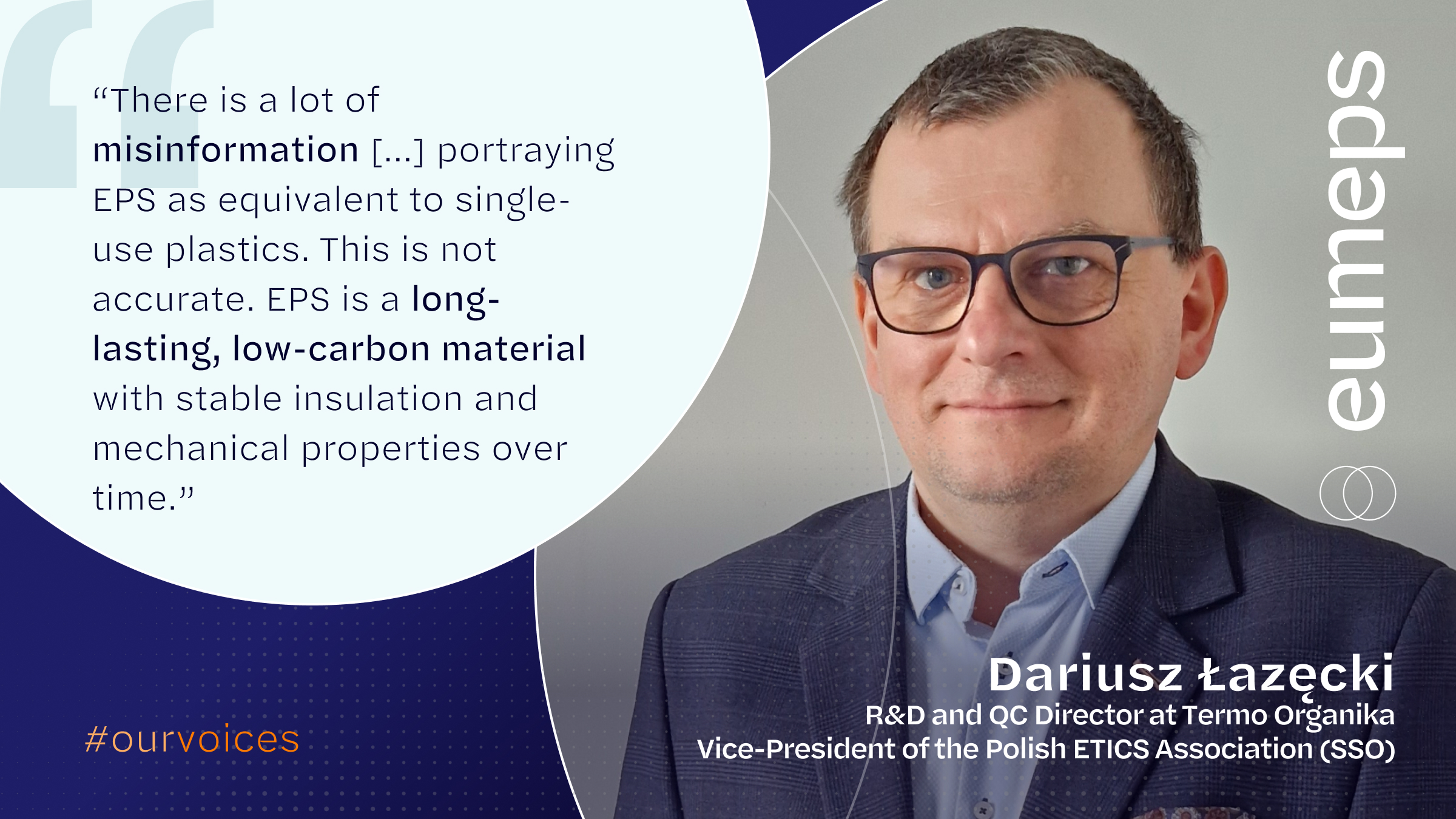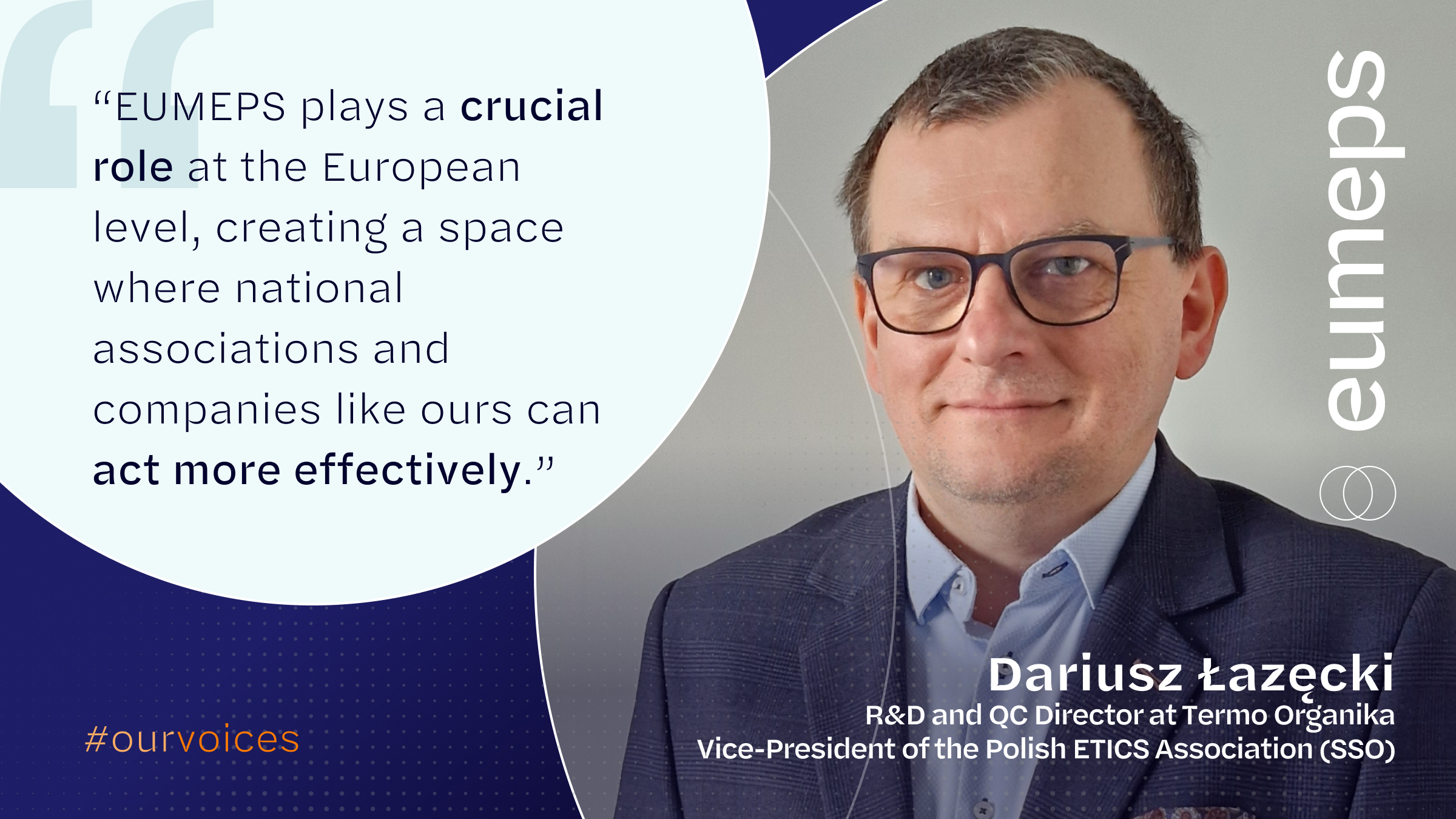In this edition of Faces of EUMEPS, we speak with Dariusz Łazęcki, R&D and QC at Termo Organika, Vice-President at Polish ETICS Association (SSO) and newly appointed Board Member of EUMEPS, representing EPS converters. With over 25 years of experience in the ETICS and insulation sector, Dariusz offers a grounded perspective on the role of EPS in sustainable construction, the importance of product quality, and the challenges facing European manufacturers under evolving regulations. His insights reflect both the strength of national leadership and the value of coordinated European advocacy.
Could you share your professional journey leading to your current role as Director of Development and Quality at Termo Organika? What aspects of the EPS industry have particularly captivated your interest?
I have been working in the ETICS business for over 25 years, and with Termo Organika for nearly 17. I joined the company during a period of expansion into construction chemistry products. Naturally, our focus was on those components integrated into insulation systems (ETICS), such as adhesives, plasters, and paints. Given that Termo Organika was—and still is—the market leader in EPS production in Poland, our systems were inevitably based on EPS. Today, Termo Organika is not only the leading EPS converter in Poland but also a significant ETICS supplier.
Termo Organika is recognised as a leading producer of EPS insulation in Poland. What are the key factors that have contributed to the company's success in delivering high-quality insulation solutions?
Our primary focus has always been on quality—ensuring that the declared product parameters match the actual performance. Customers quickly recognised that they were receiving a reliable product, one that would deliver the expected thermal insulation for their homes. They understood that "savings" made during this stage of construction could result in significantly higher heating bills later. Choosing a slightly cheaper EPS might lead to long-term costs that outweigh the initial price difference. Therefore, investing in high-quality EPS yields real, measurable benefits with a very short payback period.

As a new member of the EUMEPS Board representing converters, what are your primary objectives in this role? How do you envision enhancing the representation of converters within the association?
EUMEPS has long promoted EPS as the best choice for building insulation—especially in ETICS—thanks to its combination of performance and cost-effectiveness. EPS-based ETICS systems are durable, visually adaptable, efficient, and easy to install. I want EUMEPS to continue advocating for EPS, focusing not only on technical merits but also on broader marketing, public relations, and appropriate legislative support at the European level. If these efforts are effective, they will encourage more companies to join the association.
The EPS industry is undergoing significant changes, particularly concerning sustainability and circularity. What do you perceive as the main challenges and opportunities for EPS converters in this evolving landscape?
The greatest challenge is to raise awareness that EPS is 100% recyclable. Unfortunately, there is a lot of misinformation—sometimes politically or commercially motivated—portraying EPS as equivalent to single-use plastics. This is not accurate. EPS is a long-lasting, low-carbon material with stable insulation and mechanical properties over time. When dismantled, EPS from ETICS can be fully recycled.
Converters need to adopt and promote best practices in production and installation to minimise environmental impact. Effective solutions exist—such as protective nets on scaffolding, industrial vacuum cleaners, or hot wire cutters instead of saws—to reduce waste during insulation work. The task ahead is not just technical, but communicational.

Termo Organika has been proactive in advocating for quality standards and product certification. How do you see the role of standardisation and compliance evolving in the EPS sector, especially with the introduction of new regulations like the revised Construction Products Regulation (CPR)?
EPS is manufactured according to the harmonised EN 13163 standard, which has served us well for many years, clearly defining its thermal, mechanical, and fire-related properties. In principle, the new CPR should not drastically alter this. However, some EU Member States impose additional national requirements, especially for ETICS applications, which can distort the internal market.
Unfortunately, the revised CPR does not seem to address these discrepancies or offer robust mechanisms for enforcement. Meanwhile, European producers face increasing regulatory burdens that foreign producers often avoid. This puts us at a competitive disadvantage—an issue that deserves louder advocacy.
You have participated in discussions regarding the new CPR. From your perspective, what are the key implications of this regulation for EPS manufacturers and the broader construction industry?
Europe is experiencing a regulatory overload. While regulation is essential, many of the new rules appear excessive or misaligned with real market needs. Companies must now dedicate entire legal departments just to remain compliant. Yet, some foreign producers are entering the market with unmatchable prices, ignoring the obligations European manufacturers face.
Let me be clear: I am a supporter of a united Europe. It is one of the best outcomes of the post-war period. But something is going wrong. We must strike a balance between oversight and competitiveness.

How does Termo Organika approach innovation in product development, particularly in response to the increasing demand for sustainable and energy-efficient building materials?
We aim to be a leader in EPS insulation by delivering products that meet or exceed declared parameters. We closely monitor market expectations and trends and adapt accordingly. Our state-of-the-art machinery, well-equipped laboratories, and skilled workforce enable us to innovate effectively. We also maintain strong partnerships across the value chain, drawing inspiration from both suppliers and customers.
Collaboration across the EPS value chain is crucial for advancing recycling and circular economy initiatives. What strategies do you believe are effective in fostering cooperation between raw material suppliers, converters, and recyclers?
It’s a feedback loop: each actor in the chain must understand the needs of the others. Raw material producers must ensure their products are suitable for efficient conversion and future recycling. Additives that hinder recyclability should be avoided. Fortunately, I believe there is already growing mutual understanding and cooperation among suppliers, converters, and recyclers.
In your view, what role does EUMEPS play in supporting national associations and companies like Termo Organika in navigating regulatory challenges and promoting EPS as a sustainable material choice?
EUMEPS plays a crucial role at the European level, creating a space where national associations and companies like ours can act more effectively. While we are responsible for our activities in Poland, these depend on the strategic direction and support that EUMEPS provides. We contribute to EUMEPS’s initiatives and also benefit greatly from them—especially in changing perceptions of EPS as a modern, sustainable insulation material.
Looking ahead, what are your aspirations for the EPS industry in Europe, and how do you see Termo Organika contributing to achieving these goals?
I dream that EPS will become the go-to choice for thermal insulation across Europe, just as it is in Poland, where EPS-based ETICS systems account for 70–85% of installations. Achieving this will require honest communication about the advantages—and yes, limitations—of EPS. The truth is, EPS offers numerous benefits. I would need a long time to come up with any serious downsides—but I don’t want to waste that time!
Dariusz Łazęcki’s reflections underline a clear ambition: to consolidate EPS as the preferred choice for insulation across Europe through quality, innovation, and transparency. His technical expertise, combined with a pragmatic view of regulatory and market realities, adds weight to EUMEPS’s efforts in promoting EPS as a reliable, circular, and climate-relevant material. As the industry faces increasing scrutiny and shifting demands, voices like his play a critical role in shaping an informed, united response across the EPS value chain.

